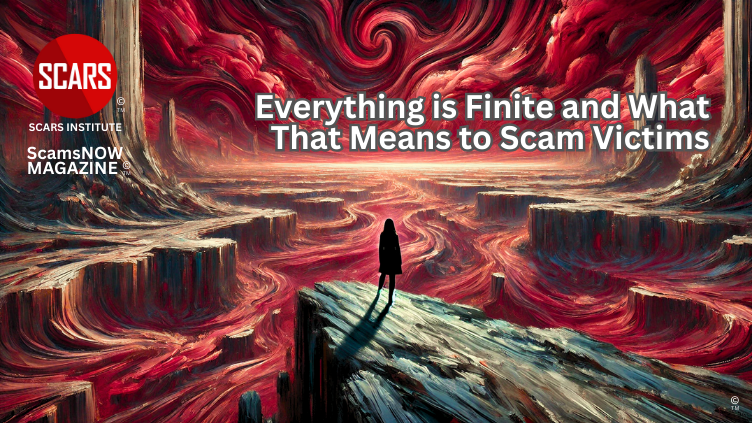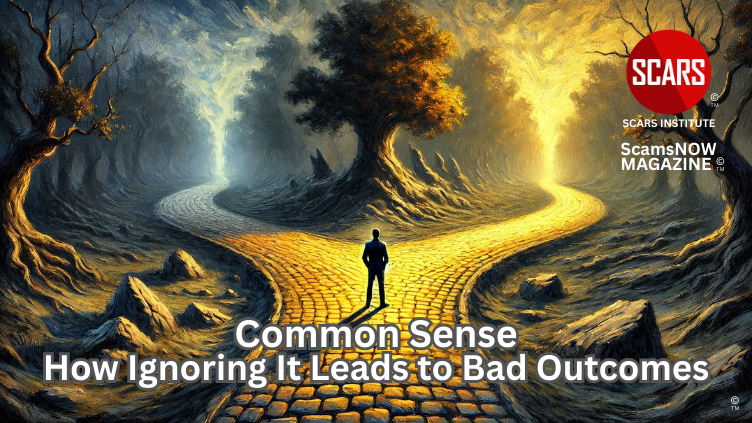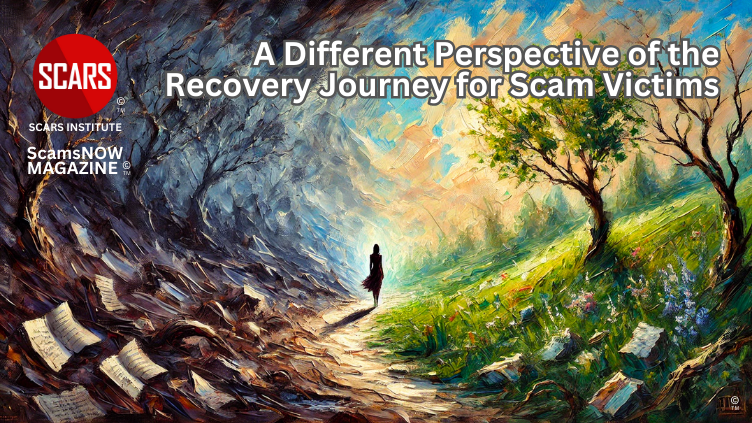A Different Perspective of the Recovery Journey for Scam Victims
Finding Light in the Ashes: A Journey of Recovery for Victims of Relationship Scams
Primary Category: Scam Victims Recovery Psychology
Intended Audience: Scam Victims-Survivors / Family & Friends
Authors:
• Vianey Gonzalez B.Sc(Psych) – Licensed Psychologist, Specialty in Crime Victim Trauma Therapy, Neuropsychologist, Certified Deception Professional, Psychology Advisory Panel & Director of the Society of Citizens Against Relationship Scams Inc.
• Tim McGuinness, Ph.D., DFin, MCPO, MAnth – Anthropologist, Scientist, Polymath, Director of the Society of Citizens Against Relationship Scams Inc.
About This Article
Finding Light in the Ashes: A Journey of Recovery for Victims of Relationship Scams draws on the philosophical wisdom of Hermann Hesse to offer a path forward for those recovering from the emotional devastation of a relationship scam. By embracing individual healing journeys, confronting internal contradictions, and rediscovering meaning through creativity, personal spirituality, and simplicity, scam victims are invited to reclaim their lives and identities.
Hesse’s work reminds us that transformation is slow, painful, and often nonlinear—but deeply possible. This article reframes recovery not as a return to who you were, but as a becoming—of someone wiser, more resilient, and fully capable of writing the next chapter. In letting go of blame and illusion, victims move from the ashes of betrayal into the light of self-authored renewal.

Finding Light in the Ashes: A Journey of Recovery for Victims of Relationship Scams
Inspired by the Wisdom of Hermann Hesse
The sting of betrayal cuts deep. For those who have fallen victim to relationship scams—where trust was offered like a fragile gift only to be shattered by deceit—the pain can feel endless. The promises of love, the shared dreams, the vulnerability laid bare—all revealed as a mirage crafted to exploit. You’re left with trauma, shame, and a haunting question: How do I heal from this? Recovery is not a straight path, but a winding, personal journey. Drawing from the philosophy of Hermann Hesse, a writer who understood the depths of the human soul, this article offers six guideposts to help you reclaim yourself from the ashes of deceit. Hesse’s timeless insights—on individuality, duality, spirituality, creativity, and the modern world—light a way forward through the darkness.
Embrace Your Individual Journey
Hesse believed that true meaning comes not from following the crowd, but from walking your own path. In Siddhartha, his protagonist rejects prescribed roles—monk, merchant, lover—until he finds his truth through lived experience. For you, a scam victim, this means your healing cannot be dictated by others’ timelines or expectations. Society might urge you to “move on” quickly, or whisper that you should have seen the signs. But your pain is yours alone, and so is your recovery.
Start by honoring where you are. The betrayal wasn’t your fault—scammers are architects of illusion, preying on trust and hope. Write down what you feel without judgment: the anger, the grief, the flickers of self-doubt. This is your story, not theirs. Like Siddhartha sitting by the river, listen to yourself. Healing begins when you accept that this journey is uniquely yours, and no one else can define its pace or shape.
Face the Duality Within
Hesse saw life as a dance of opposites—light and shadow, joy and sorrow. In Steppenwolf, the protagonist wrestles with his divided nature until he learns to embrace both halves. After a scam, you might feel torn too: the part of you that trusted so openly warring with the part that now fears ever trusting again. There’s shame in being deceived, yet pride in your capacity to love. This inner conflict is not a flaw—it’s human.
Don’t run from these contradictions. Sit with them. Ask yourself: What did I give that was beautiful, even if it was misused? Your openness was a strength, not a weakness, though it was exploited. At the same time, let the cautious voice speak—it’s protecting you now. Recovery isn’t about choosing one side, but integrating both. Picture yourself as a tree: roots deep in lessons learned, branches still reaching for light. Hesse teaches us that wholeness comes from holding the tension of opposites, not erasing it.
Seek a Personal Spirituality
Hesse distrusted rigid doctrines, favoring a spirituality born from within. After a relationship scam, you might feel abandoned—by the scammer, by fate, even by a higher power you once trusted. Organized answers might ring hollow now: Why did this happen to me? Hesse’s Siddhartha suggests the divine isn’t found in temples, but in the quiet of your own soul.
Build a practice that’s yours alone. It could be meditation, where you breathe out the chaos and inhale calm. Or a walk in nature, where the steadiness of trees reminds you of resilience. Some find solace in journaling prayers—not to a deity, but to their future self. This isn’t about escaping pain, but meeting it with something larger than the scam. Hesse saw spirituality as a river flowing through us all; dip into it, and let it wash away the grime of betrayal, bit by bit.
Harness the Power of Creativity
In The Glass Bead Game, Hesse celebrated art as a bridge to the eternal. When words fail and trust feels like a foreign language, creativity can be your voice. The trauma of a scam locks you in a cycle of “what ifs”—what if I’d seen through the lies? Creativity breaks that cycle, giving shape to the shapeless.
Try this: take a blank page and sketch the person you were before the scam, then the one you are now. No skill required—just lines and colors. Or write a letter to the scammer you’ll never send, spilling every raw emotion. Burn it if you want. Music, poetry, even gardening—any act of making pulls you out of victimhood and into agency. Hesse knew that creating isn’t about perfection; it’s about touching something beyond the pain. Let it be your rebellion against the scammer’s theft of your peace.
Reject the Noise of Modernity
Hesse critiqued a world obsessed with surface—wealth, status, speed. Relationship scams thrive in this soil, often born online where curated profiles mask predators. The modern rush to connect, to swipe right, to trust fast, can leave you feeling like the scam was inevitable. But Hesse’s longing for depth over shallowness offers a lifeline.
Step back from the digital churn. Delete the apps that echo the scam’s origin, if you can. Replace screen time with slowness—reading a book, cooking a meal, sitting with a friend who listens. The scammer exploited a world that prizes instant gratification; you can reclaim one that values real presence. Hesse’s characters often found truth in nature or silence—try a day unplugged, letting the quiet rebuild what the noise tore down. This isn’t retreat; it’s resistance.
Trust in Time and Transformation
Hesse’s stories are rarely about instant redemption. Siddhartha wanders for years; the Steppenwolf stumbles through despair before glimpsing hope. Your recovery, too, is a slow unfolding. The trauma of a scam—financial loss, emotional wreckage—can feel permanent. But Hesse believed in the human capacity to transform, not by force, but by persistence.
Mark small victories: a day you don’t replay the lies, a night you sleep without nightmares. Build new routines that anchor you—coffee with a trusted friend, a yoga class, a hobby the scammer never touched. Trust doesn’t return overnight, and that’s okay. Hesse’s wisdom lies in patience: the river of time smooths even the sharpest stones. You won’t be the same, but you can become someone stronger, wiser, still capable of love.
A Final Reflection
Hermann Hesse once wrote, “Some of us think holding on makes us strong, but sometimes it is letting go.” The scammer took your trust, perhaps your money, your sense of safety. Holding onto blame—toward them or yourself—keeps you tethered to their shadow. Letting go doesn’t mean forgetting; it means freeing yourself to grow beyond their reach.
Picture this: a garden where the scam is a weed pulled out, leaving space for new roots. You are the gardener, not the victim. Hesse’s philosophy reminds us that life’s deepest wounds are also its richest soil. Your betrayal, your trauma, your pain—they’re chapters, not the book. Turn the page. The story ahead is yours to write.
Conclusion: Turning Pain into Wisdom, and Endings into Beginnings
The journey through the aftermath of a relationship scam is not linear, clean, or predictable. It is full of contradictions—deep sorrow beside the stubborn will to survive, lingering shame beside emerging self-respect. Hermann Hesse’s philosophy doesn’t offer shortcuts or false comfort, but it does offer something far more powerful: the truth that within the darkness, you still have the capacity to grow. You may not recognize yourself today, but transformation is already underway. Every small act of healing—every boundary you set, every memory you face, every moment you choose not to give up—moves you further from the ruins and closer to the self that is waiting to be rebuilt.
The scam is not the end of your story. It is the event that pushed you into a deeper awareness of who you are and what you’re capable of surviving. You are not just someone who was deceived. You are someone who now sees more clearly. Who has felt the worst and is still here. You are someone who is learning to live with complexity, to create beauty from pain, and to seek meaning where trust was broken. In the spirit of Hesse’s most enduring characters, you are not returning to who you were—you are becoming someone new. And that journey, though difficult, is sacred. Let it unfold. You have already begun.
-/ 30 /-
What do you think about this?
Please share your thoughts in a comment below!
Statement About Victim Blaming
SCARS Institute articles examine different aspects of the scam victim experience, as well as those who may have been secondary victims. This work focuses on understanding victimization through the science of victimology, including common psychological and behavioral responses. The purpose is to help victims and survivors understand why these crimes occurred, reduce shame and self-blame, strengthen recovery programs and victim opportunities, and lower the risk of future victimization.
At times, these discussions may sound uncomfortable, overwhelming, or may be mistaken for blame. They are not. Scam victims are never blamed. Our goal is to explain the mechanisms of deception and the human responses that scammers exploit, and the processes that occur after the scam ends, so victims can better understand what happened to them and why it felt convincing at the time, and what the path looks like going forward.
Articles that address the psychology, neurology, physiology, and other characteristics of scams and the victim experience recognize that all people share cognitive and emotional traits that can be manipulated under the right conditions. These characteristics are not flaws. They are normal human functions that criminals deliberately exploit. Victims typically have little awareness of these mechanisms while a scam is unfolding and a very limited ability to control them. Awareness often comes only after the harm has occurred.
By explaining these processes, these articles help victims make sense of their experiences, understand common post-scam reactions, and identify ways to protect themselves moving forward. This knowledge supports recovery by replacing confusion and self-blame with clarity, context, and self-compassion.
Additional educational material on these topics is available at ScamPsychology.org – ScamsNOW.com and other SCARS Institute websites.
-/ 30 /-
What do you think about this?
Please share your thoughts in a comment below!
TABLE OF CONTENTS
- Finding Light in the Ashes: A Journey of Recovery for Victims of Relationship Scams
- About This Article
- Finding Light in the Ashes: A Journey of Recovery for Victims of Relationship Scams
- Embrace Your Individual Journey
- Face the Duality Within
- Seek a Personal Spirituality
- Harness the Power of Creativity
- Reject the Noise of Modernity
- Trust in Time and Transformation
- A Final Reflection
- Conclusion: Turning Pain into Wisdom, and Endings into Beginnings
CATEGORIES
![NavyLogo@4x-81[1] A Different Perspective of the Recovery Journey for Scam Victims - 2025](https://scamsnow.com/wp-content/uploads/2025/04/NavyLogo@4x-811.png)
ARTICLE META
Important Information for New Scam Victims
- Please visit www.ScamVictimsSupport.org – a SCARS Website for New Scam Victims & Sextortion Victims.
- SCARS Institute now offers its free, safe, and private Scam Survivor’s Support Community at www.SCARScommunity.org – this is not on a social media platform, it is our own safe & secure platform created by the SCARS Institute especially for scam victims & survivors.
- SCARS Institute now offers a free recovery learning program at www.SCARSeducation.org.
- Please visit www.ScamPsychology.org – to more fully understand the psychological concepts involved in scams and scam victim recovery.
If you are looking for local trauma counselors, please visit counseling.AgainstScams.org
If you need to speak with someone now, you can dial 988 or find phone numbers for crisis hotlines all around the world here: www.opencounseling.com/suicide-hotlines
Statement About Victim Blaming
Some of our articles discuss various aspects of victims. This is both about better understanding victims (the science of victimology) and their behaviors and psychology. This helps us to educate victims/survivors about why these crimes happened and not to blame themselves, better develop recovery programs, and help victims avoid scams in the future. At times, this may sound like blaming the victim, but it does not blame scam victims; we are simply explaining the hows and whys of the experience victims have.
These articles, about the Psychology of Scams or Victim Psychology – meaning that all humans have psychological or cognitive characteristics in common that can either be exploited or work against us – help us all to understand the unique challenges victims face before, during, and after scams, fraud, or cybercrimes. These sometimes talk about some of the vulnerabilities the scammers exploit. Victims rarely have control of them or are even aware of them, until something like a scam happens, and then they can learn how their mind works and how to overcome these mechanisms.
Articles like these help victims and others understand these processes and how to help prevent them from being exploited again or to help them recover more easily by understanding their post-scam behaviors. Learn more about the Psychology of Scams at www.ScamPsychology.org
SCARS INSTITUTE RESOURCES:
If You Have Been Victimized By A Scam Or Cybercrime
♦ If you are a victim of scams, go to www.ScamVictimsSupport.org for real knowledge and help
♦ SCARS Institute now offers its free, safe, and private Scam Survivor’s Support Community at www.SCARScommunity.org/register – this is not on a social media platform, it is our own safe & secure platform created by the SCARS Institute especially for scam victims & survivors.
♦ Enroll in SCARS Scam Survivor’s School now at www.SCARSeducation.org
♦ To report criminals, visit https://reporting.AgainstScams.org – we will NEVER give your data to money recovery companies like some do!
♦ Follow us and find our podcasts, webinars, and helpful videos on YouTube: https://www.youtube.com/@RomancescamsNowcom
♦ Learn about the Psychology of Scams at www.ScamPsychology.org
♦ Dig deeper into the reality of scams, fraud, and cybercrime at www.ScamsNOW.com and www.RomanceScamsNOW.com
♦ Scam Survivor’s Stories: www.ScamSurvivorStories.org
♦ For Scam Victim Advocates visit www.ScamVictimsAdvocates.org
♦ See more scammer photos on www.ScammerPhotos.com
You can also find the SCARS Institute’s knowledge and information on Facebook, Instagram, X, LinkedIn, and TruthSocial
Psychology Disclaimer:
All articles about psychology and the human brain on this website are for information & education only
The information provided in this and other SCARS articles are intended for educational and self-help purposes only and should not be construed as a substitute for professional therapy or counseling.
Note about Mindfulness: Mindfulness practices have the potential to create psychological distress for some individuals. Please consult a mental health professional or experienced meditation instructor for guidance should you encounter difficulties.
While any self-help techniques outlined herein may be beneficial for scam victims seeking to recover from their experience and move towards recovery, it is important to consult with a qualified mental health professional before initiating any course of action. Each individual’s experience and needs are unique, and what works for one person may not be suitable for another.
Additionally, any approach may not be appropriate for individuals with certain pre-existing mental health conditions or trauma histories. It is advisable to seek guidance from a licensed therapist or counselor who can provide personalized support, guidance, and treatment tailored to your specific needs.
If you are experiencing significant distress or emotional difficulties related to a scam or other traumatic event, please consult your doctor or mental health provider for appropriate care and support.
Also read our SCARS Institute Statement about Professional Care for Scam Victims – click here
If you are in crisis, feeling desperate, or in despair, please call 988 or your local crisis hotline – international numbers here.
More ScamsNOW.com Articles
A Question of Trust
At the SCARS Institute, we invite you to do your own research on the topics we speak about and publish. Our team investigates the subject being discussed, especially when it comes to understanding the scam victims-survivors’ experience. You can do Google searches, but in many cases, you will have to wade through scientific papers and studies. However, remember that biases and perspectives matter and influence the outcome. Regardless, we encourage you to explore these topics as thoroughly as you can for your own awareness.

























![scars-institute[1] A Different Perspective of the Recovery Journey for Scam Victims - 2025](https://scamsnow.com/wp-content/uploads/2025/04/scars-institute1.png)

![niprc1.png1_-150×1501-1[1] A Different Perspective of the Recovery Journey for Scam Victims - 2025](https://scamsnow.com/wp-content/uploads/2025/04/niprc1.png1_-150x1501-11.webp)